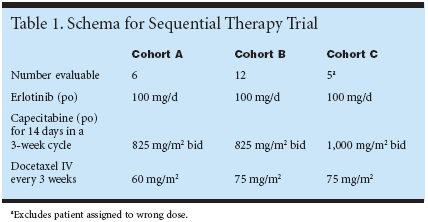Study Explores Whether Erlotinib Produces Additive Efficacy When Used With Capecitabine and Docetaxel
This special supplement to Oncology News International includes 28 reportswith updated information on clinical trials investigating capecitabine and other agents inthe treatment of advanced colorectal and breast cancers, and other solid tumors.The reports summarize selected presentations from the 39th Annual Meeting of theAmerican Society of Clinical Oncology (ASCO) and related educational symposiaheld in conjunction with ASCO.
CHICAGO-An open-label, phaseIB study found that the combination oferlotinib (Tarceva), docetaxel (Taxotere),and capecitabine (Xeloda) is generally welltolerated and shows antitumor activity(ASCO poster 180). Data from a pharmacokineticanalysis indicate that there is nopharmacokinetic interaction between eithercapecitabine or docetaxel and erlotiniband its metabolite in the treatmentof metastatic breast cancer.The study was based on previous workthat showed the HER1 epidermal growthfactor receptor (EGFR) is expressed inbreast tumors, where it is thought to playa role in tumor growth and progression."Erlotinib is an orally active, potent,selective inhibitor of the HER1/EGFRtyrosine kinase with clinical activity forthe treatment of solid tumors," theinvestigators reported in their poster atASCO. R. Jones, MD, of the BeatsonOncology Centre in Glasgow, UK, was thelead author.

Studies Suggest BenefitsCapecitabine has been approved forthe treatment of patients with metastaticbreast cancer, and the combination ofcapecitabine and docetaxel has shown significantadvantages in progression-freesurvival and overall survival rates.Results of phase II monotherapy studies of erlotinib 150 mg/d in patients withadvanced non-small-cell lung, ovarian,and head and neck cancer suggest a survivalbenefit compared with current treatmentoptions. Combining erlotinib withcapecitabine and docetaxel may improvesurvival in patients with metastatic breastcancer. According to the investigators, new therapies are urgently required to prolongprogression-free and overall survivalrates and to improve quality of life inpatients with metastatic breast cancer."Preclinical data suggest that the combinationof capecitabine and erlotinib resultsin additive efficacy. Erlotinib has afavorable toxicity profile and thereforewe conducted a trial to evaluate treatmentwith erlotinib plus capecitabine and docetaxelin patients with locally advanced ormetastatic breast cancer," the investigatorsexplained in their poster.Determining Dose LevelsThe primary objective of the study wasto determine the maximum tolerated doseof erlotinib in combination with capecitabineand docetaxel in patients with locallyadvanced or metastatic breast cancer.The secondary objectives included thesafety and pharmacokinetic profile of thecombination regimen and evaluating itseffect on response in the same patients.To be eligible for the study, patientsmust have had histologically confirmed,incurable disease; no prior adjuvant chemotherapyand no more than one regimenof chemotherapy for their disease;and acceptable cardiac, renal, and hepaticfunction. Twenty-four patients were enrolled,of which 23 were evaluable.Dose levels were selected based on previouslypublished safety and efficacy datafor each agent. Patients received medicationsequentially (see Table 1), up to sixcycles of therapy, with 21 days per cycle.Patients with an objective response or stabledisease after six cycles were eligible toreceive further treatment until disease progressionor unacceptable toxicity.Patient assessments included: tumorresponse using the standard response evaluationcriteria in solid tumors (RECIST);safety data by monitoring adverse eventsusing the National Cancer Institute Common Toxicity Criteria (NCI-CTC version2.0); and changes in laboratory variables,including ophthalmologic examination. Pharmacokinetic ParametersPharmacokinetic parameters, includingmaximum plasma concentration(Cmax), time to reach maximum plasmaconcentration (Tmax), area under theplasma concentration-time curve (AUC),and apparent half-life (t 1/2), were evaluatedfor capecitabine and docetaxel alone(day 1), and erlotinib alone (days 21 and36) or in combination with capecitabineand docetaxel (day 22).When one or more of three patients,or two or more of six patients, in a cohortexperienced a dose-limiting toxicity(DLT), the cohort below was increased to12 patients. The expanded cohort was usedto determine the toxicity profile at themaximum tolerated dose.In cohort C, three DLTs were observed(one grade 4 febrile neutropenia, and twoevents of grade 3 diarrhea) out of sixpatients. Cohort B was then expanded to12 patients to confirm the maximum tolerateddose. To date, patients have receivedup to 10 cycles of treatment. Apartfrom the DLTs already described above,the most frequent adverse events observed were neutropenia, rash, hyperbilirubinemia,and diarrhea.Antitumor ActivityIn terms of antitumor activity, fourpatients in cohort A had partial responses,of which three were confirmed. Twopatients in cohort B had an unconfirmedcomplete response, and five patients hada partial response, one of which was unconfirmed.Four patients in cohort C hada partial response, of which two were confirmed.Furthermore, the analysis concludedthat there is no pharmacokinetic interactionbetween capecitabine or docetaxeland erlotinib and its metabolite. There isno evidence of a causative relationshipbetween erlotinib exposure (Cmax orAUC at cycle 2) and any laboratory abnormality,such as bilirubin and transaminaseelevations, occurring within thefirst three cycles. There is no apparentcausative relationship between erlotiniband the most commonly reported adverseevents within the first three cycles."The combination of erlotinib, docetaxel,and capecitabine is generally welltolerated. The recommended phase II doseof erlotinib is 100 mg/d po in combinationwith oral capecitabine 825 mg/m2 bidand docetaxel 75 mg/m2 IV in this patientpopulation," the investigators concludedin their poster.Based on preliminary analyses of availabledata, there is no evidence of any appreciablepharmacokinetic interaction betweenerlotinib, capecitabine, anddocetaxel or their metabolites. "Overall,the results of this study are encouragingand further trials should be considered toevaluate this combination therapy in metastaticbreast cancer," the investigators stated.Final safety, efficacy, and phamacokineticdata will be presented when the studyis completed.